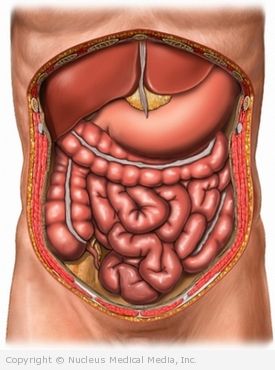Exploratory laparotomy
(Abdominal Exploration; Laparotomy, Exploratory)
Exploratory laparotomy – Definition
Laparotomy – open surgery of the abdomen to view the organs and tissue inside.
Exploratory laparotomy – Reasons for Procedure
This procedure is done to evaluate problems in the abdomen.
Problems that may need to be examined with an exploratory laparotomy include:
- A hole in the bowel wall
- Ectopic (outside the womb) pregnancy
- Endometriosis
- Appendicitis
- Damage to an organ from trauma
- Infection in the abdomen
- Cancer
Exploratory laparotomy – Possible Complications
Complications are rare, but no procedure is completely free of risk. If you are planning to have a laparotomy, your doctor will review a list of possible complications, which may include:
- Bleeding
- Infection
- Blood clots
- Damage to organs
- Hernia formation
- Large scars
- Reaction to the anesthesia
Some factors that may increase the risk of complications include:
- Previous abdominal surgery
- Diabetes
- Heart or lung disease
- Weak immune system
- Blood disorders
- Taking certain medicines
- Smoking, alcohol abuse, or drug use
Be sure to discuss these risks with your doctor before the procedure.
Exploratory laparotomy – What to Expect
Prior to Procedure
Leading up to your procedure:
- Your doctor may perform the following:
- Physical exam
- Blood and urine tests
- Ultrasound — a test that uses sound waves to visualize the inside of the body
- Computed tomography (CT) scan — a type of x-ray that uses a computer to make pictures of the inside of the body
- Magnetic resonance imaging (MRI) scan — a test that uses magnetic waves to make pictures of the inside of the body
- Talk to your doctor about your medicines. You may be asked to stop taking some medicines up to one week before the procedure, like:
- Anti-inflammatory drugs (eg, aspirin)
- Blood thinners, like clopidogrel (Plavix) or warfarin (Coumadin)
- Arrange for a ride home.
- The night before, eat a light meal. Unless told otherwise by your doctor, do not eat or drink anything after midnight.
Exploratory laparotomy – Anesthesia
- General anesthesia (almost always used) — blocks pain and keeps you asleep through the surgery; given through an IV in your hand or arm
- Spinal anesthesia (used in very ill patients) — the area from the chest down to the legs is numbed
Exploratory laparotomy – Description of the Procedure
The doctor will make one long incision in the skin on your abdomen. The organs will be examined for disease. The doctor may take a biopsy. If the problem is something that can be repaired or removed, it will be done at this time. The opening will be closed using staples or stitches.
Exploratory laparotomy – How Long Will It Take?
About 1-4 hours
Exploratory laparotomy – How Much Will It Hurt?
Anesthesia will prevent pain during the procedure. For pain and soreness after surgery, you will get medicine.
Exploratory laparotomy – Average Hospital Stay
Several days — If you have problems, you may need to stay longer.
Exploratory laparotomy – Post-procedure Care
At the Hospital
- You may need to wear special socks or boots to help prevent blood clots.
- You may have a foley catheter for a short time to help you urinate.
- You may use an incentive spirometer to help you breathe deeply.
At Home
It may take several weeks for you to recover.
- Follow your doctor’s instructions.
- The doctor will remove the sutures or staples in 7-10 days.
- Take proper care of the incision site. This will help to prevent an infection.
- Ask your doctor about when it is safe to shower, bathe, or soak in water.
- During the first two weeks, rest and avoid lifting.
- Slowly increase your activities. Begin with light chores, short walks, and some driving. Depending on your job, you may be able to return to work.
- To promote healing, eat a diet rich in fruits and vegetables.
- Try to avoid constipation by:
- Eating high-fiber foods
- Drinking plenty of water
- Using stool softeners if needed
Exploratory laparotomy – Call Your Doctor
After you leave the hospital, contact your doctor if any of the following occurs:
- Fever or chills
- Redness, swelling, increasing pain, excessive bleeding, or any discharge from the incision site
- Increasing pain or pain that does not go away
- Your abdomen becomes swollen or hard to the touch
- Diarrhea or constipation that lasts more than 3 days
- Bright red or dark black stools
- Dizziness or fainting
- Nausea and vomiting
- Cough, shortness of breath, or chest pain
- Pain or difficulty with urination
- Swelling, redness, or pain in your leg
- In case of an emergency, call for medical help right away.

